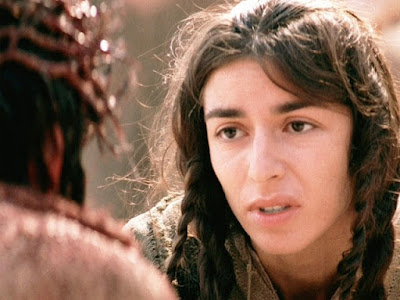Impacciatore had wanted to be an actor since she was just 4 years old, but she grew up insecure about her looks and abilities so she pursued a degree in marketing and advertising instead. Unable to shake her childhood dream, she took up acting as a hobby, which led her to write for television. When she presented one of her scripts, she was asked to audition for it. Setting aside her fears, she gave it a shot, landing that role and many others to follow. Her sense of humor made her a natural for TV comedies.
Legendary director Ettore Scola cast her in her first feature film, opposite Gérard Depardieu, in the 2000 drama “Concorrenza sleale” (Unfair Competition). Her emotionally charged breakout performance came a year later as Livia in Gabriele Muccino’s international blockbuster “L’ultimo bacio” (The Last Kiss). In a 2010 interview with Fra Noi, she described it as “the movie that changed my life.”
In 2004, Mel Gibson cast her as Veronica in his controversial film “The Passion of the Christ.” It was such an intense experience for Impacciatore, she felt as though she had, in fact, become her character. “On the set, there was this incredible atmosphere. Instead of acting, I felt like I was living the experience. I believed that (Jim Caviezel) was Jesus Christ, and I was Veronica,” she explained in our 2010 interview. “I know that sounds crazy. However, when I saw my scenes, I realized that I was indeed living an experience, not just acting.”After those two high-profile films, she continued to work steadily in Italy, earning a reputation as one of the country’s most talented character actors. In 2010, she reprised her role of Livia in “Baciami ancora” (Kiss Me Again), Muccino’s sequel to “L’ultimo bacio.” In 2018, the two teamed up again for the acclaimed ensemble comedy “A casa tutti bene” (There Is No Place Like Home), which was a worldwide success.
 |
| On the set of "A casa tutti bene" |
Three years later, she appeared in Fabio Mollo’s Amazon Original “Anni da cane” (Dog Years), a coming-of-age story about a teenager who measures her age in dog years, believing that she will die soon. The delusion was triggered by a car crash that injured her and killed her father, after which she adopted a stray dog that was hurt in the accident. Impacciatore plays the girl’s mother, an accountant who treads lightly between being an authority figure and sympathizing with her daughter’s trauma.
Impacciatore has received rave reviews for her latest role as Valentina, a strict hotel manager in the second season of the hit HBO series “White Lotus.” Valentina walks around with a chip on her shoulder but occasionally reveals her softer side, feeding stray kittens during her lunch break and protecting her female employees from their flirty male co-workers.During the series, a few comments are made about Monica Vitti in reference to other characters. Ironically, Impacciatore embodies the qualities that made Vitti so versatile, sliding effortlessly from comedy to drama and back. Impacciatore takes that talent to another level, often accomplishing the feat in a single scene.
“My dream is to spend my entire life being an actress, and my dream is to become one of the best Italian actresses ever,” she told me. “I don’t care about money or being recognized or being popular. That is all secondary. To me, what is important and what gives me joy and happiness is to simply play a character.”
She is indeed living her dream. Click here to follow her adventures on Instagram. The second season of “White Lotus” is available to stream on several platforms, including YouTube, Hulu and Vudu. Several of the aforementioned films are available through Amazon. Click on the titles for direct links.
- Written by Jeannine Guilyard for the March 2023 issue of Fra Noi magazine. Click here to subscribe.



Comments
Post a Comment